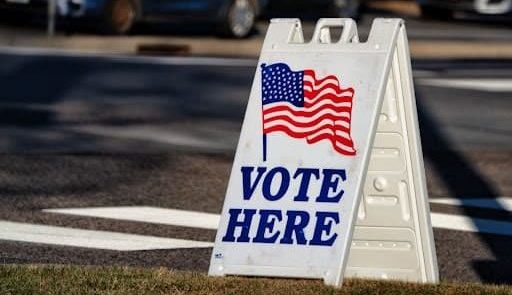When Christina Henderson takes office next year, the D.C. Council will become majority Black for the first time since 2012 and majority female for the first time in more than two decades. She and incumbent At-large Councilmember Robert White, a Democrat, overcame 21 other challengers in this year’s race for the two at-large seats. Henderson, a self-described “pragmatic progressive,” received 14.77% of the contested votes, defeating former councilmember Vincent Orange, progressive frontrunner Ed Lazere, and the popular moderate Marcus Goodwin — all independents.
Henderson was a former staffer for David Grosso, her predecessor in the at-large council seat who did not seek another term. His endorsement aided her in the race. One of the at-large seats was required to be filled by a candidate of a different party than the council majority (Democrat). Henderson, an independent, fit the criterion. As she prepares for her new position, Street Sense Media had the opportunity to interview her about her plans for homelessness and housing in the District.
Henderson discussed the housing equity report Mayor Muriel Bowser released in October 2019, which outlines a plan for adding 36,000 units of housing throughout the city by 2025, with over 12,000 units reserved as affordable for low-income residents. She supports the plan but believes that building more housing past that point may be unnecessary, given D.C.’s vacancy rate, which has only increased since the beginning of the COVID-19 pandemic.
[Read more: Can the mayor deliver on her call for equitable distribution of 12,000 new affordable housing units by 2025?]
As of November 2019, months before the health crisis, the District government reported there were roughly 9,800 vacant apartments spread across the city. But luxury units accounted for 40.5% percent of those vacancies and 91.8% of the net additions to apartment inventory over the previous year.
“I’ve seen other analyses say that we need more [units]. But I think that many of those analyses were done before COVID. So I feel like if you look at what’s happening now in terms of the housing stock across the city, we have very high risk. Many of those are from market-rate units. But what can we, the city, be doing to help convert some of those already vacant units to housing folks from low-income?” Henderson said. “I know that right now, in this COVID environment that we’re dealing with, we’re going to have a situation where we have more units than people. The question is, do we have units that are affordable for the folks who are in need of housing?”
When asked about the federal measurement used to determine what housing costs are deemed affordable, the area median income, Henderson said that it may be necessary to calculate D.C.’s AMI separately from the surrounding counties. “I’ve seen a proposal from someone who has suggested that we even need to be more targeted than that, by calculating the income requirements based on ward.” Henderson said. “I think we need to acknowledge that we need more deeply affordable units in more areas across the city.”
Half of the 10 wealthiest counties in the country are included in the geographic area HUD uses to calculate the AMI, which in turn is used by the D.C. Department of Housing and Community Development to issue limits on housing programs. Both the Inclusionary Zoning and the Home Purchase Assistance programs are only available to individuals and families who earn at least 50% of the AMI ($44,100 for an individual, $63,000 for a family of four). Yet there are more than 50,000 renter households in D.C. that earn at or below 30% of the AMI, according to the National Low Income Housing Coalition.
Henderson said she wants to retool these programs as part of the effort to create housing stock that meets the needs of all people in the District.
One thing she is excited to address as a councilmember is housing preservation, which she has previously said on Twitter can be accomplished through expanding rent control and investing in public housing. She said it is important that the affordable housing units D.C. has now should be maintained rather than demolished. Preservation, according to Henderson, is key to maintaining housing for residents who struggle to afford the local housing market.
“In terms of public housing, we had 11,000 public housing units in 1986, and now we’re down to about 8,000,” Henderson said, “So we got to hold on to what we have.” This is no small feat, as the D.C. Housing Authority determined in 2019 that its properties were in need of $2.2 billion of repairs after years of federal disinvestment.
She also mentioned supporting community land trusts, where the District puts mowamu.org/…/d-c-s-public-housing-stock-requires-2-2-billion-in-repairs-housing-authority-saysney to help boost affordable homeownership. “I often feel that in our affordable housing conversation, it focuses only on rentals,” Henderson said. “I’m not of the belief that just because you’re working property in the District that you can’t own property in your city. So how can we help? How can we boost that for families? I feel that the community land trust is an option here.”
Henderson said that maintaining neighborhoods, investing in amenities and services without pricing people out of their homes, is also important for fighting systemic racism in housing policy.
Henderson noted that in the past the federal government would raze neighborhoods, primarily Black neighborhoods, and the residents of those neighborhoods were not properly compensated for losing their homes. Racist exploitation like this adds up, preventing families from building wealth over generations as costs continue to rise. And in the present, increasing housing costs are pricing out current residents at the lower income levels, which are predominantly made up of African Americans, and are a growing burden especially for older residents, according to a 2017 report by Maurice Jackson, the inaugural chair of D.C.’s Commission on African American Affairs.
D.C. was found by the National Community Reinvestment Coalition to be the most intensely gentrified city in the country from 2000 to 2012, when more than 20,000 Black residents were displaced. And while an estimated 46% of the District’s population identified as African American in 2019, more than 86% of single homeless adults and more than 95% of homeless families identified as Black during a count conducted in January. In light of these trends, local advocates are increasingly drawing a connection between housing justice and systemic racism in the District.
Henderson said that it is important for people to be supported in their troubled situations rather than being kept down in their moment of crisis. “I think that housing is incredibly important in terms of justice in our city, especially around racism solutions.” Henderson said.
When asked about moving more people experiencing homelessness into permanent housing in the District, Henderson said she had been critical of the rapid rehousing program in the past.
“The mayor’s office calls it a great success,” she said. “But we look at the percent of people who end up returning to the system and that tells me that it’s not working as intended.”
A 2017 report 2017 by the Washington Legal Clinic for the Homeless titled “Set up to fail” noted that two out of five families in rapid rehousing were able to maintain their housing independently. However, there is no indication that these families returned to the program, and DHS claims that 85% of rapid rehousing clients did not move back into shelters, though there have been disputes over what that means.
[Read more: Problems with DC’s rapid rehousing program remain after years of concerted reform efforts]
The councilmember-elect noted that many who go into the rapid rehousing program won’t be able to afford market rate rent, but additional vouchers haven’t been offered. She has also noted that it is important to support these individuals through the Department of Human Services, particularly in terms of mental health support and permanent supportive housing.
Christina Henderson will join the D.C. Council in January.
Reginald Black contributed reporting.





